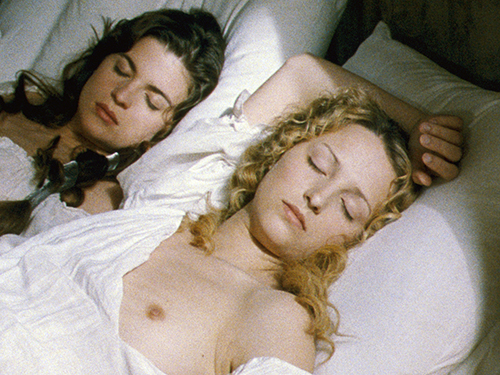
« Ce qui m’intéresse davantage c’est ce que le français actuel a perdu par rapport au français d’autrefois, à savoir certainement la clarté et l’articulation. J’aime que les gens articulent, et je ne pense pas que cela enlève la spontanéité. Ce que disent les comédiens aujourd’hui me semble souvent de plus en plus incompréhensible. Cela tient à leur manière de le dire. Avant de tourner un film, je fais toujours parler mes acteurs, pour voir si leur voix me plaît et s’ils sont compréhensibles. Je leur fais dire des textes. Je leur fais répéter les textes du film. Je fais sur cette question de la prononciation et de l’articulation un gros travail. Ce fut le cas dans Les Amours d’Astrée et de Céladon. Dans un texte de cette époque, on peut et il faut insister sur les mots. Cela n’a rien d'artificiel. Prenons un exemple : « Vous avez bien de la hardiesse à soutenir ma vue après m’avoir offensée. Va tromper une autre. Va, perfide, t’adresser à quelqu’un à qui tes perfidies ne sont pas encore connues. » Ce n’est pas une réplique que l’on peut dire comme ça. Il y a des mots importants qui doivent se détacher quand on la dit. [Éric Rohmer lit la phrase en insistant sur certains mots] « Vous avez bien de la HARDIESSE de soutenir ma vue après m’avoir OFFENSÉE. VA tromper une autre. VA perfide, t’adresser à quelqu’un à qui tes PERFIDIES ne sont pas encore connues. » À chaque fois, il convient de se demander quels sont les mots importants, afin d’insister sur ces mots. »
Eric Rohmer1
Positif: Did you film using direct sound?
Eric Rohmer: In general, when you’re making a period film, you use post-synchronization, which I don’t like (although one of my favorite films, La Collectionneuse, was entirely post-synchronized). I’ve always preferred direct sound. I managed to use this for L’Astrée and I’m proud of it.
There’s an intimacy and a warmth in the voices.
How can we distinguish a good from a bad sound? I think sound is bad in all films, apart from mine! Let’s say I’m very demanding. I have a fault which is also a quality, the same one as Buñuel: he was really deaf, and you can hear people in his films really well; I’m losing my hearing as well, so I need people to speak clearly. And language from that era is articulated more clearly than nowadays.
You insist on clear articulation from your actors.
Yes, we rehearse the text a lot. To cast my actors, I make them read from classical theatre such as Racine, Corneille, Molière . . . and I listen. I want them to be as careful with the prose as the verses. I am the opposite of those drama teachers who say, “Be natural, don’t exaggerate!” When there’s a lot of information, you have to emphasize nouns and verbs.
Were the actors naturally at ease?
Some of my actors aren’t French. Stéphanie Crayencour is Belgian, and she doesn’t have the faults of contemporary French speakers. André Gillet isn’t Parisian, and Véronique Reymond is Swiss; the French they speak is more beautiful than that of Parisians. My actors in Astrée had pictorial gestures, they had the same sense of where the frame was. I never tell my actors how to gesticulate, that happens naturally. Actors are interested in finding their own way of acting, especially when they are young: they find new and surprising things. They knew how to make use of the location; for example Celadon, when he is in front of the hut with Adamas, he butts the stone with his foot, leans over, and taps the ground. He did that himself, if I had told him to do it, it could have appeared artificial.
Eric Rohmer in an interview with Positif2
- 1Eric Rohmer, « De la musique en image: entretien avec Éric Rohmer » entretien par Frank Madlener & Gabriel Leroux, L’étincelle, juin 2008.
- 2Philippe Fauvel, Noël Herpe, « Entretien avec Eric Rohmer: je suis cinéaste, pas historien », Positif (559), 2007. Translated in: Fiona Handyside (Ed.), Eric Rohmer: Interviews (Jackson: University Press of Mississippi, 2013), 175.

